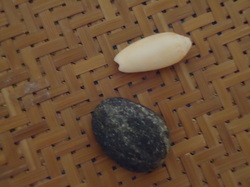Iré and Osorbo: The Orientation of the Reading

Ibo mark the orientation
When an initiated priest or priestess of Santería does a reading with the dilogún (cowrie shells), one of the first things the client needs to know is if the reading comes with iré (blessings, good fortune) or osorbo/ osogbo (obstacles, problems, misfortune). The orientation of the reading is determined by the use of ibo/ibbo, which take various forms, including a ball of efún or cascarilla (chalk made from ground eggshells), a stone, a shell, and a piece of bone. The diviner hands the ibo to the client and asks him to rub them gently together in his two closed hands and then separate them, one in each hand. The client keeps his hands closed so the diviner doesn't know what's in them, and then the diviner throws the dilogún to see which odu (letter, sign, symbol) appears. The diviner has to memorize the hierarchy of the odu to know which are major and minor odu, and he has to know the exact order of the odu's ages to determine senority, because this tells him which hand to look at. Depending on the odu that falls, the diviner asks to see what's in the right or left hand, and the particular kind of ibo he finds there tells him if the reading comes in iré or osorbo. Once that determination has been made, the diviner continues to throw the dilogún and ask the client to manipulate the ibo until he discovers all the information he needs to interpret the odu correctly. This includes knowing where the iré or osorbo comes from. Iré is easier to interpret because it takes only one form (blessings), but it can come from many different sources: the Orichás, egun, the client's godmother or godfather, the client's own head, or some other place. Osorbo is more complex because it has many different forms (death, sickness, tragedy, loss, arguments, witchcraft, etc.), and it can also come from different sources: an Orichá, egun, the client's own head or hands, enemies, scandalmongers, a family member, etc. Generally, a reading that comes with osorbo takes more time than one that comes with iré, because the diviner has to find out more information.
Adversity Builds Character

The individual can shape his destiny
While most clients always hope their reading comes in iré, experienced Santeros say that in some ways it's better to get a reading with osorbo, because people grow by facing adversity and looking for solutions to problems. People who always have good fortune sometimes feel overconfident and make bad choices or careless mistakes, because they (wrongly) believe their good fortune is guaranteed. Iré and osorbo are temporary conditions. They're gauges of the client's energy, something like a blood pressure reading that lets a patient know if he's in good health or needs medical attention. Iré and osorbo give the same kind of information about the client's spiritual well-being. A client who has osorbo works with the diviner to find out what needs to be done to correct the problem. This involves some kind of ebó/ ebbó (offering), which can take a variety of forms (determined in the dilogún reading). Generally, the client's asked to make some behavior modification, or to take some kind of action to correct the problem that he's facing. Osorbo doesn't condemn the client to unhappiness and bad fortune; instead, it gives him an opportunity to fix what's wrong. Santeros say that the Orichás help those who help themselves, and it's not acceptable for us to sit back and expect the Orichás to do everything for us. Santería's a very interactive religion, and unless the client works to resolve his own problems, the Orichás won't put in much effort on his behalf.
In the Lucumí worldview, good and bad are linked together as two halves of a single whole. If no bad existed in the world, we wouldn't recognize good. If no good existed, we wouldn't recognize bad. The same holds true for iré and osorbo. If humans only experienced iré, they wouldn't have any reason to evolve. The human race would become stagnant and, if ever confronted with a natural disaster, they'd be totally unprepared to deal with it because they'd never had to deal with problems before. No one wants to have osorbo with them all the time, but that's why ebó exists as a religious principle. Something very simple like a pumpkin for Ochún or a red apple for Changó can be enough to satisfy the Orichás, and they'll work with the client to remedy the problem. Ebó doesn't have to be complicated or expensive; the Orichás are looking for offerings made with an open heart, sincerity and devotion and, above all, a commitment on the part of the client to follow the Orichás advice and make changes as needed.
In the Lucumí worldview, good and bad are linked together as two halves of a single whole. If no bad existed in the world, we wouldn't recognize good. If no good existed, we wouldn't recognize bad. The same holds true for iré and osorbo. If humans only experienced iré, they wouldn't have any reason to evolve. The human race would become stagnant and, if ever confronted with a natural disaster, they'd be totally unprepared to deal with it because they'd never had to deal with problems before. No one wants to have osorbo with them all the time, but that's why ebó exists as a religious principle. Something very simple like a pumpkin for Ochún or a red apple for Changó can be enough to satisfy the Orichás, and they'll work with the client to remedy the problem. Ebó doesn't have to be complicated or expensive; the Orichás are looking for offerings made with an open heart, sincerity and devotion and, above all, a commitment on the part of the client to follow the Orichás advice and make changes as needed.
Misfortune Can Be Remedied
In most readings, the iré or osorbo orientation is understood to be in effect for about a month (or a moon cycle). The diviner doesn't impose permanent tabboos on the client but, rather, suggests things like: "For the next month, avoid large crowds," or "Don't answer your door at night if someone knocks after you've gone to bed," or "Don't handle knives," or "Don't talk about your plans with other people." These temporary prohibitions are meant to steer the client away from potentially dangerous situations that are related to the odu that's shown up during the reading. By foreseeing situations where the osorbo can manifest itself and by avoiding those situations, the client can avoid the misfortune that the osorbo talks about. The client doesn't have to experience misfortune; he can remedy it if he listens to the advice the Orichás give him during the dilogún reading.
